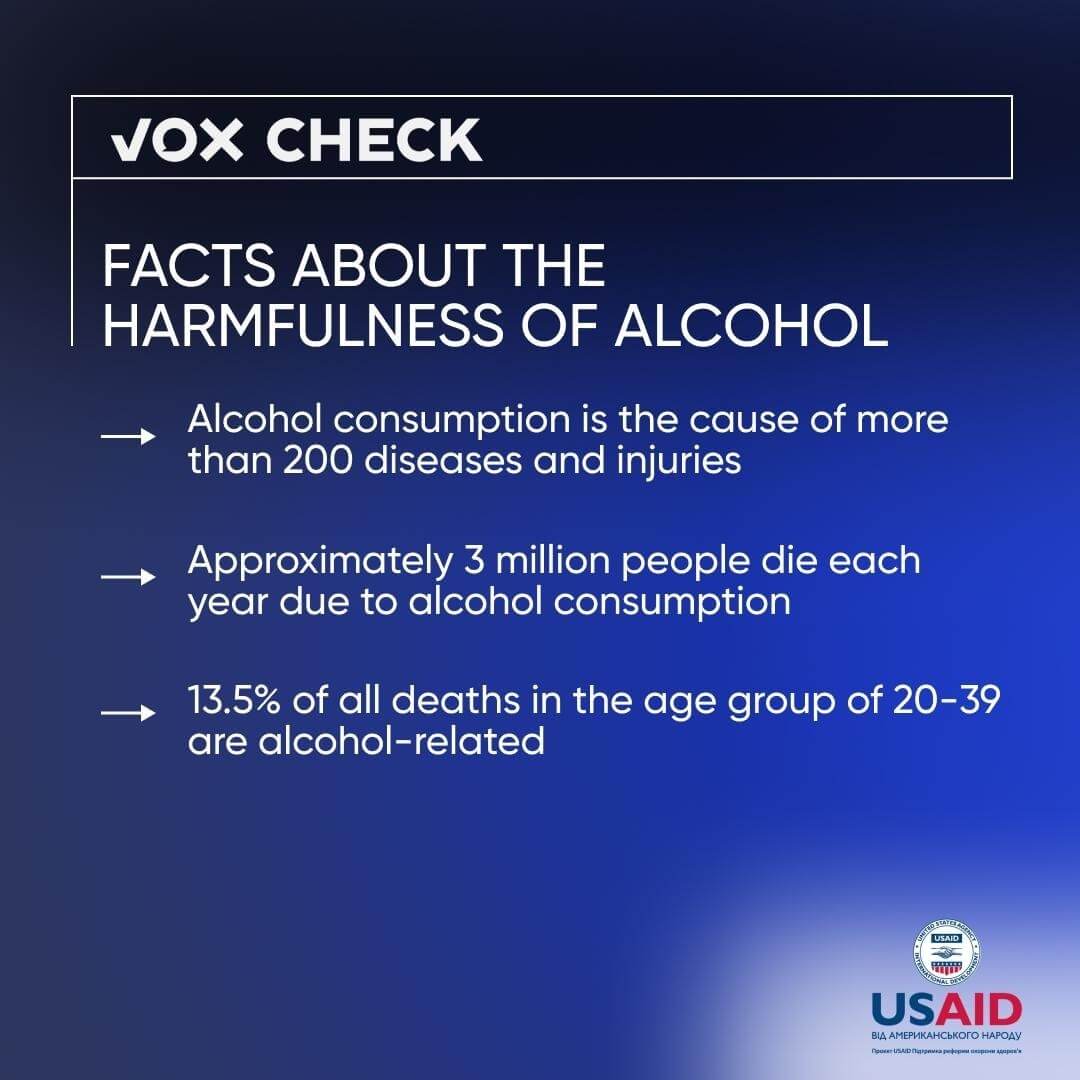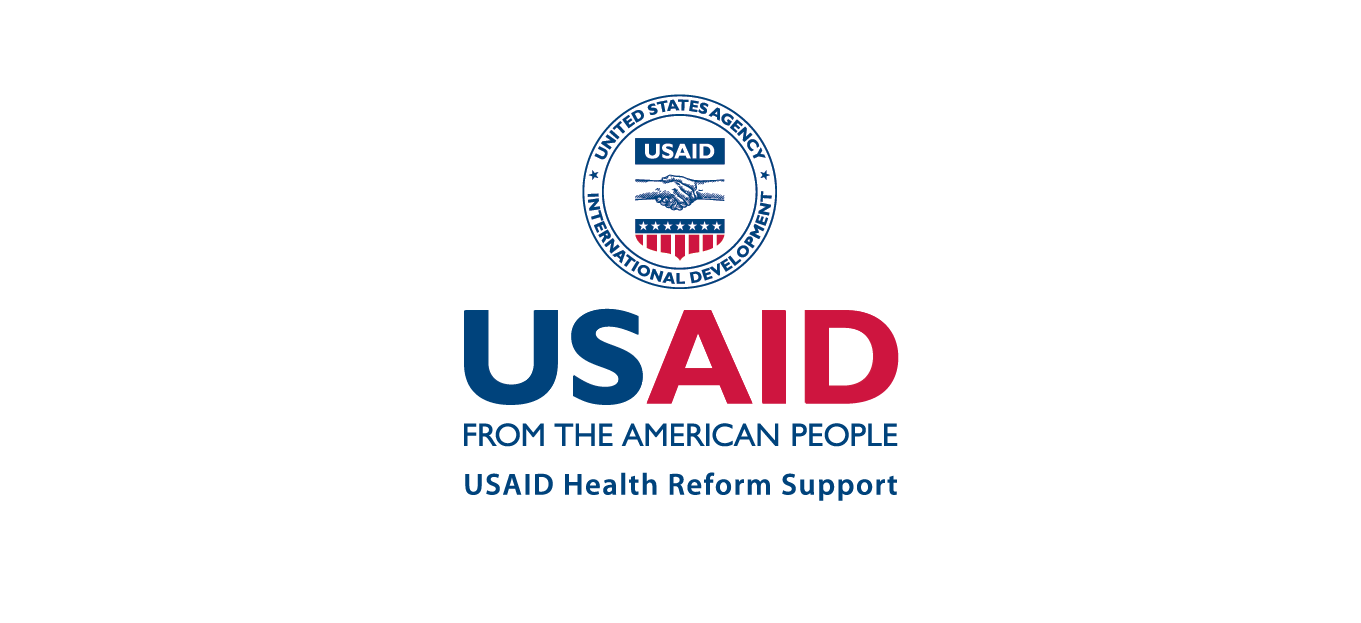This week, we refute the reports of regional telegram channels that moderate alcohol consumption is allegedly good for health. “A glass of vodka every day should protect against cardiovascular diseases,” the authors of the channels write, referring even to scientific studies. We explain what’s wrong with this scientific research and why there is no such thing as a safe dose of alcohol.
With the support of the USAID Health Reform Support project, VoxCheck analyzes and refutes public health narratives spread in the information space of Ukraine, Belarus, and russia on a weekly basis.
Disinformation: Research shows that drinking alcohol every day is good for your health
Ukrainian telegram channels write that drinking alcohol every day is beneficial. Scientists have conducted research on the effects of alcohol and found that daily alcohol consumption is good for the heart. Thus, the consumption of 50 grams of vodka once a week reduces the risk of coronary heart disease by 7%, and with daily consumption — by 40%.
What’s the reality?
We were unable to find the research referenced in the news article. However, scientific studies have indeed mentioned some moderate benefits of alcohol consumption. For example, when investigating the link between alcohol consumption and initial symptoms of cardiovascular diseases, researchers found that abstaining from alcohol, compared to moderate consumption, increased the risk of developing symptoms. Excessive alcohol consumption increased the risk of unforeseen coronary insufficiency, heart failure, and cardiac arrest. The article based on the study was published in 2017.
As noted by one of the authors of the study, epidemiologist Steven Bell from the University of Cambridge, the experiment only involved individuals who regularly consume or have consumed alcohol. The impact of alcohol on the body of individuals who have not previously consumed alcoholic beverages was not investigated. Therefore, it refers to primary risks for those who already have a higher likelihood of developing cardiovascular diseases due to alcohol consumption, rather than absolute risks for everyone. Alcohol in any dosage cannot be considered a preventive measure against heart diseases. “Based on these findings,” Bell said, “at no point … is there a level of consumption that appears to lower the overall risk of developing any of the wide array of diseases investigated in comparison to non-drinking. The take-home message being that people shouldn’t drink under the belief that it will lower their risk of disease, and those of us who opt to drink should minimize our intake if we wish to prolong our life and well-being”.
What’s more, a study published in 2023 by scientists from the Canadian Institute for Research on Substance Use and the Department of Psychology at the University of Portsmouth in the UK found errors in the methodologies of most of the papers that purportedly proved the “benefits” of moderate alcohol consumption. Most of these studies were observational, meaning they may have found links or associations, but they may have been misleading and did not prove cause and effect. Scientists say that previous studies have not taken into account that people with moderate alcohol consumption have better health compared to those who are currently abstaining from alcohol. This is due to the fact that the last group often includes those who stopped drinking due to health problems.
On the other hand, those who consume alcohol moderately are generally moderate in other areas as well. They are usually wealthier, engage in sports more often, follow a healthy diet, and are less likely to be overweight. Researchers adjusted the results of about 100 studies on the impact of alcohol, using statistical analysis to account for other factors influencing health. As a result, scientists observed that the predicted health benefits of alcohol consumption sharply diminish and become statistically insignificant. In other words, the “benefit” of alcohol consumption is actually a statistical error caused by a flaw in the methodology.
The World Health Organization (WHO) states that no level of alcohol consumption is safe for health. “We cannot talk about a so-called safe level of alcohol use. It doesn’t matter how much you drink – the risk to the drinker’s health starts from the first drop of any alcoholic beverage. The only thing that we can say for sure is that the more you drink, the more harmful it is – or, in other words, the less you drink, the safer it is”, explains Dr Carina Ferreira-Borges, acting Unit Lead for Noncommunicable Disease Management and Regional Advisor for Alcohol and Illicit Drugs in the WHO Regional Office for Europe.
Source: World Health Organization
The Ministry of Health of Ukraine also emphasizes that there is no safe dose of alcohol. The Press Service of the Ministry of Health of Ukraine conducts information campaigns to increase public awareness about the harmfulness of alcohol. The Ministry of Health of Ukraine reminds that:
- Using alcoholic beverages to ‘warm up’ is extremely dangerous. Under the influence of alcohol, the nervous reactions that signal the body’s cooling slow down. As a result, a person gradually loses control over the sensation of cold, which can lead to hypothermia.
- Alcoholic beverages are not a stress reliever. On the contrary, alcohol consumption can lead to increased levels of anxiety, aggression, and loss of self-control, thus having a negative impact on psychological well-being.
This information piece was produced with the assistance of the United States Agency for International Development (USAID), provided on behalf of the people of the United States of America. This article’s content, which does not necessarily reflect the views of USAID, the United States Government, is the sole responsibility of Deloitte Consulting under contract #72012118C00001.
Attention
The author doesn`t work for, consult to, own shares in or receive funding from any company or organization that would benefit from this article, and have no relevant affiliations





